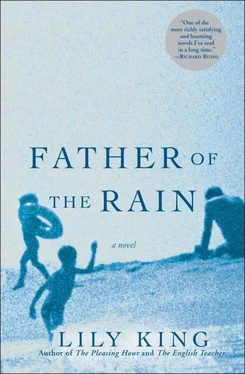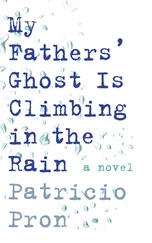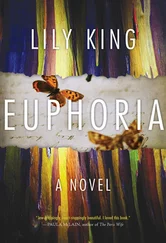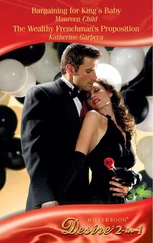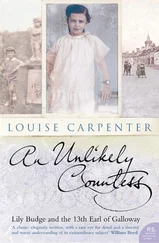Another line opens up, then another, and we are through— our bags tagged and tossed down a chute — and sent to security. It’s not like regular American security with one guy taking your ticket and asking you to step through the metal detector. Here there are many men in uniform with big gold badges and dogs on complicated leashes, dogs not panting in the heat but eyeing us seriously.
One of them twitches and the other two bristle in response. Their ears lift and their wet black noses flare and tremble. Then they are all barking at once, showing their long yellow teeth, straining on their leads, yanking the men who hold them across the brick paving to Frank. The dogs surround him. The rest of us watch from the other side of the metal detector. Frank and his duffel are taken out of line immediately and led away. The dogs follow, their barking drowning out all other sounds except one loud brief, “Mom!” before Frank is shoved around a corner and disappears.
Catherine stands with her hand over her mouth. On the loudspeaker our flight to Miami is announced.
“I’m getting on that fucking plane no matter what happens, you hear me?”
Catherine nods her head slowly.
“This is not my fault. I have nothing to do with this. Nothing.” My father looks down the corridor and laughs his disgusted laugh. “Jesus Christmas. What kind of idiot would—”
“Shut up.” Her voice scrapes viciously, like she learned it from my father.
“You,” he says quietly, sifting through the pile of tickets he is holding with shaking fingers, “have a nice trip home.” He hands her four tickets. “C’mon, Daley. I’m getting you out of here.”
We follow the flow of people out across the tarmac, up the flight of metal stairs, and inside the small plane.
My father stops halfway down the small aisle and points to two seats on the right. “Here we go.”
“You can have the window,” I tell him.
“You take it.” He is trying to be nice but he looks like he wants to lift me up and shove me in the seat.
I slip in and buckle up.
My father pushes the stewardess button next to the light above us, but she is busy directing traffic up front and doesn’t come. He pulls down the tray even though he’s not supposed to. He puts his hands on the tray and wipes it with his palms in wide sweeps. The backs of his hands are wide and brown, with veins bulging up, crisscrossed around the fine bones that connect to his fingers. I remember what it feels like to hold his hand, something I always did— crossing streets, walking through stores, driving in the car — but now never do. And then to my surprise he reaches down and takes my right hand in his. It is as warm and large as I remember.
“We’s going to be okay,” he says, and pushes the button again.
Nearly an hour later, after there has been an announcement about mechanical difficulties, after the stewardess has brought me a Coke and my father three tiny bottles, two of vodka, one of vermouth, Elyse comes running down the aisle.
“Gardie!” she says, and climbs carefully into my father’s lap without knocking the tray with the bottles on it. I’ve never heard her call him that before — I’ve never heard anyone ever call him that.
“Hello, little peanut,” he says, and pushes some hair back into her headband.
Catherine and Patrick appear at the front of the plane and look down the aisle nervously until they see us. Patrick’s face relaxes immediately and he nudges his mother toward us. Despite all the sun she’s gotten, her skin has gone sallow, dark gray beneath the eyes. She takes the seat across the aisle from my father but does not look at him. Elyse climbs off my father and takes the window seat next to her mother, and Catherine fusses with their seatbelts much longer than necessary. Patrick sits in front of me and I see his eye peering through the crack in the seat. I stick my finger in and touch his cheek. “Ow,” he says and we laugh. And then Frank slumps into the seat beside Patrick, rattling everything on my father’s tray. My father reaches out to steady the bottles, then lifts the plastic cup, still half full, and hands it to Catherine.
“I bet you could use this even more than me.”
Catherine snorts a laugh and takes the drink. Then she reaches for my father’s hand.
“Big pussy,” she says.
“Little pussy,” he says.
“What happened?” I whisper to Patrick when we are in the air.
“They couldn’t find anything. They made him strip twice, they sent his clothes through this machine, the dogs were going wild, but they couldn’t find a thing.”
I peer through the crack at Frank. An unwashed, unbrushed clump of hair covers one eye. The other is shut. The skin of his face is blighted with zits and the scars from zits. His thin lips are bunched tight. Even in sleep, he looks like he’s scheming something.
I’ve saved most of my last book for the two flights home. It’s by Edith Wharton. Paul gave it to me for Christmas. He said it was just the beginning of the edification of Daley Amory. I’d had to sneak off and look up the word edification . When I get home from St. Thomas, my mother will tell me that Paul has asked her to marry him.
I pull out the book. When Catherine notices she elbows my father and points, and my father mutters, “Jesus, Mary, and Joseph— another goddamn book.”
But I don’t care. Archer has just sent the Countess Olenska the yellow roses, and my father and Catherine’s world is already slipping away.
I didn’t want a party, but Jonathan insisted.
“Just let people be happy for you,” he said. And now he’s created my favorite kind of evening: our closest friends, his homemade $3 spaghetti sauce, and a round of Oh Hell before dinner. It’s June in Michigan. All the windows in the apartment are open. Bugs thrum and snap at the screens. There’s wine, but not enough for anyone to get drunk.
At dinner we end up counting how many of us have lost a parent. Out of the seven of us, five parents are already dead. Dan’s date, an earnest undergrad in shorts and a baseball cap, asks me how my mother died. Normally I just say she was hit by a car, but tonight — maybe because I’m leaving, maybe because she seems so young and doe-eyed — I tell her about the awful days that followed, how my father didn’t even come to the funeral. I don’t talk about my father much anymore, and I see him once a year at most, but I can feel a certain charge begin to run through me.
“He never called me or my brother to say he was sorry our mother had died,” I tell her. “Never came by. Never wrote a note. We were at her place — a mile away from his house — for a week and we never heard from him. To this day he’s never even mentioned her death to me.”
“Maybe it’s too painful for him.” Her name is Janine, I think. A psych major.
“They split up when I was eleven. They hated each other.”
“Still. Unresolved relationships can be the hardest to grieve.”
I look at her hard because she should know this if she’s going to be a shrink someday. “Some people are just assholes.”
She looks ready to argue the point, but something behind me catches her eye and her expression is forced into a smile. It’s Julie, coming into the room with a cake. Jonathan, behind her with three boxes of ice cream, starts singing, “Happy Berkeley to You,” and everyone else catches on and I try to wave them silent but they just get louder. I’m not sure I’m done complaining about my father.
Julie sets a banana cake, my very favorite dessert, in front of me. She’s decorated it with plastic palm trees and people on surfboards.
Читать дальше
